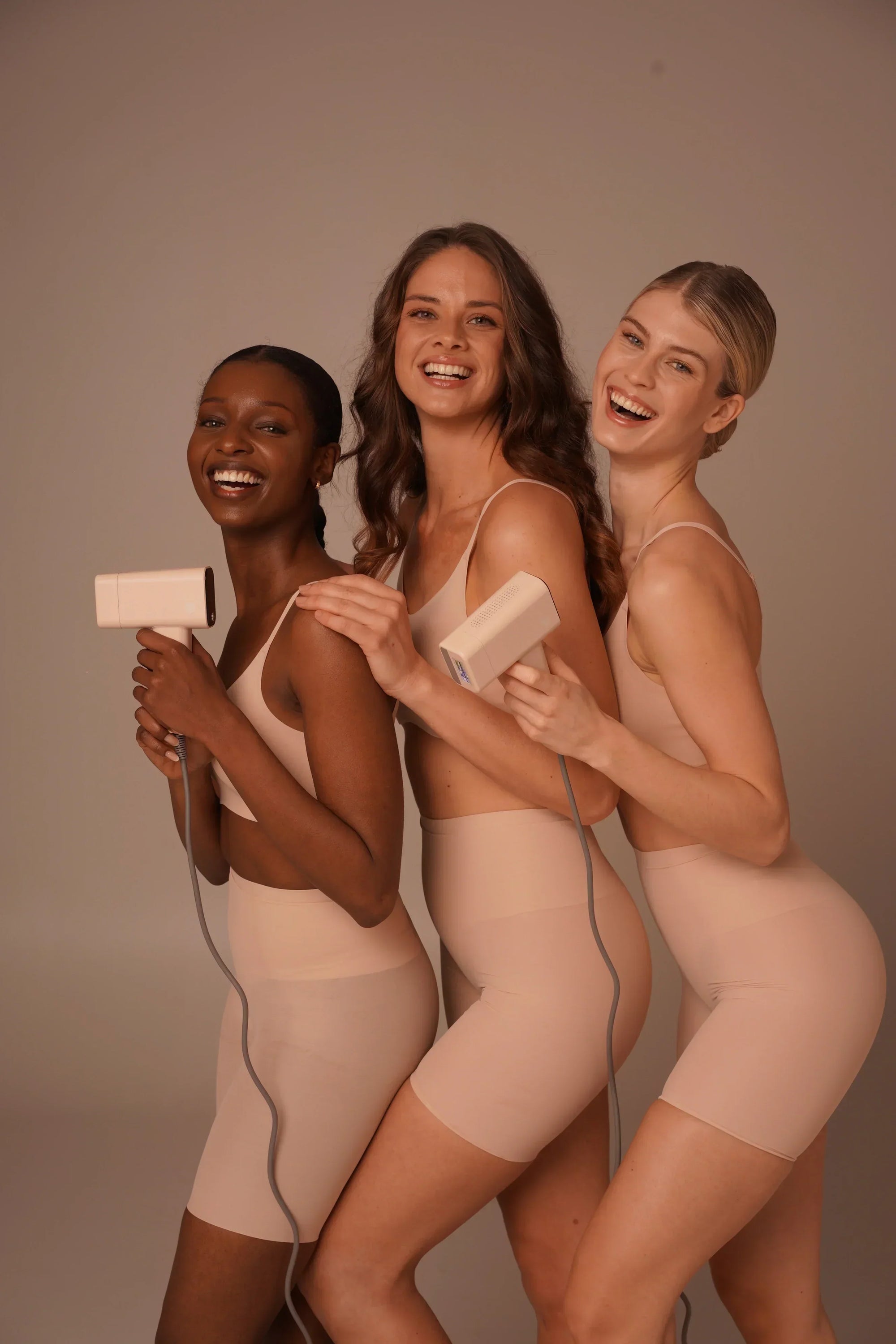Choosing the best hair removal method can be confusing, especially when deciding between Intense Pulsed Light (IPL) and laser hair removal. Both methods promise long-term hair reduction, but understanding their differences is key to choosing the right one for your skin type and personal needs. In this comprehensive guide, we'll examine IPL and laser hair removal, compare their effectiveness, and help you identify which method suits your skin type best.
Understanding IPL Hair Removal
IPL, or Intense Pulsed Light, uses broad-spectrum visible light. The pulses of light emitted by IPL devices target melanin (pigment) in hair follicles, generating heat that gradually reduces hair growth. IPL covers larger areas quickly, making treatments fast and convenient, especially for home use.
Ideal Candidates for IPL
IPL treatments are most effective on individuals with lighter skin tones (I to IV on the Fitzpatrick scale) and darker hair colors. The contrast between skin tone and hair color allows the IPL device to efficiently target the pigment within the hair follicle without harming surrounding skin.
Advantages of IPL:
-
Cost-effective treatments at home
-
Covers larger areas quickly
-
Minimal discomfort with built-in cooling features
Understanding Laser Hair Removal
Laser hair removal uses a single wavelength of concentrated light precisely focused on hair follicles. This concentrated approach ensures deeper penetration, efficiently damaging the hair follicle and providing more targeted hair reduction.
Ideal Candidates for Laser Hair Removal
Laser treatments work effectively for a broader range of skin tones, including medium to darker skin types, depending on the specific laser used (Nd:YAG, Alexandrite, or Diode). It's still most effective on dark hair, but advanced lasers offer greater flexibility for darker complexions.
Advantages of Laser Hair Removal:
-
Highly precise, targeted treatments
-
More effective on darker skin tones
-
Often requires fewer treatments for significant reduction
Comparing IPL and Laser: Key Differences
Precision
Laser hair removal offers greater precision, making it ideal for smaller, sensitive areas like the face or bikini line. IPL is better suited to larger areas, like legs, back, and arms, providing quick coverage with satisfactory results.
Treatment Time
IPL devices treat larger areas faster, significantly reducing overall treatment time compared to lasers, which require careful, targeted pulses.
Comfort Level
Both methods can cause mild discomfort; however, IPL is generally considered gentler, especially devices with integrated cooling technologies. Lasers might produce a sensation similar to a snapping rubber band against the skin.
Number of Treatments
IPL typically requires more sessions (6-10) to achieve long-term hair reduction, whereas laser treatments might achieve comparable results in fewer sessions (4-6).
Determining the Best Method for Your Skin Type
Lighter Skin (Fitzpatrick I–III)
For lighter skin tones with darker hair, both IPL and laser treatments are effective. IPL provides an affordable, convenient option for home treatments. However, laser treatments can deliver faster and more precise results, particularly for small, sensitive areas.
Medium to Dark Skin (Fitzpatrick IV–VI)
For medium to dark skin tones, laser treatments using specific wavelengths (like Nd:YAG) are more suitable and safer, as they significantly reduce the risk of hyperpigmentation and skin damage compared to IPL.
Very Light or Fine Hair
Neither IPL nor laser treatments are highly effective on very fine, blonde, white, or grey hair due to lack of sufficient pigment. In these cases, alternative hair removal methods such as electrolysis might be more appropriate.
Choosing Between Home and Professional Treatments
Home IPL devices offer cost savings, convenience, and privacy. Devices such as the Vulpés Elysea IPL are ideal for maintaining results at home. Professional laser treatments, however, offer the expertise of trained professionals, ensuring safer and more precise application, particularly for challenging skin types or areas.
Post-Treatment Care
Regardless of your chosen method, post-treatment care remains crucial:
-
Apply soothing creams or aloe vera gel post-treatment.
-
Consistently use sunscreen (SPF 30+) to protect sensitive skin.
-
Avoid heat exposure and harsh skincare products for 48 hours following treatments.
Both IPL and laser hair removal methods effectively reduce unwanted hair growth, but choosing the right method depends significantly on your skin type, hair color, budget, and personal preferences. For lighter skin and dark hair, IPL offers a practical home solution. Darker skin tones or those seeking precise treatment might find professional laser sessions more beneficial. Always consult with a professional or follow manufacturer recommendations closely to ensure safe and effective results.



